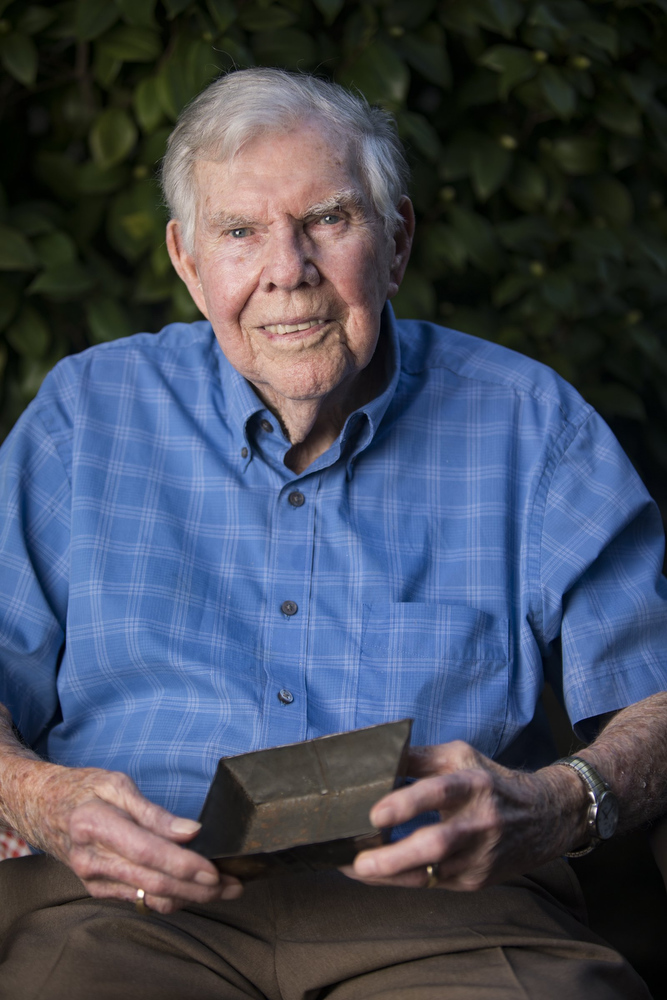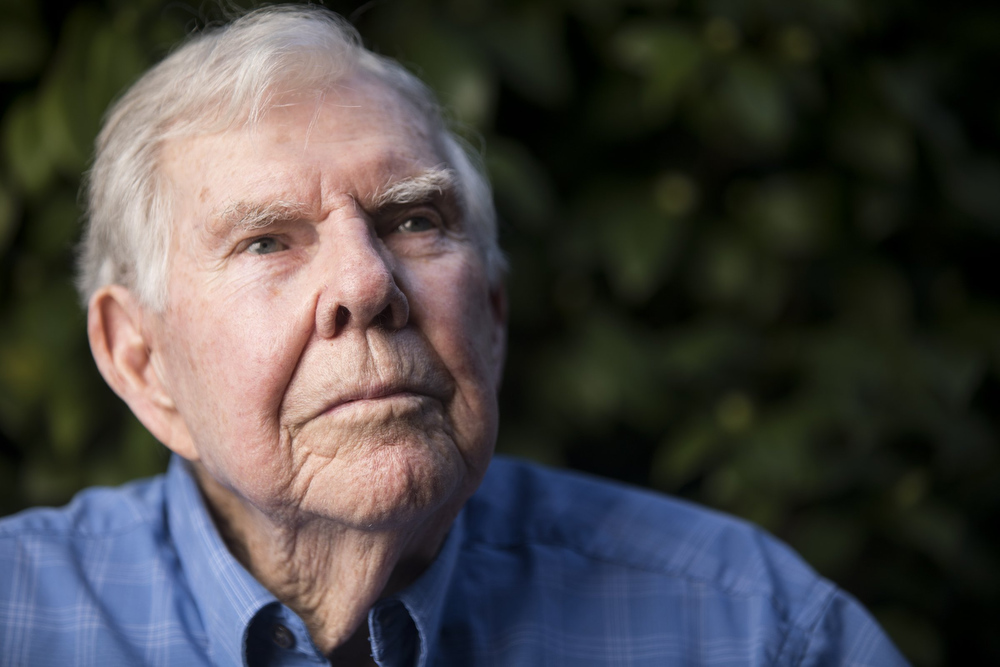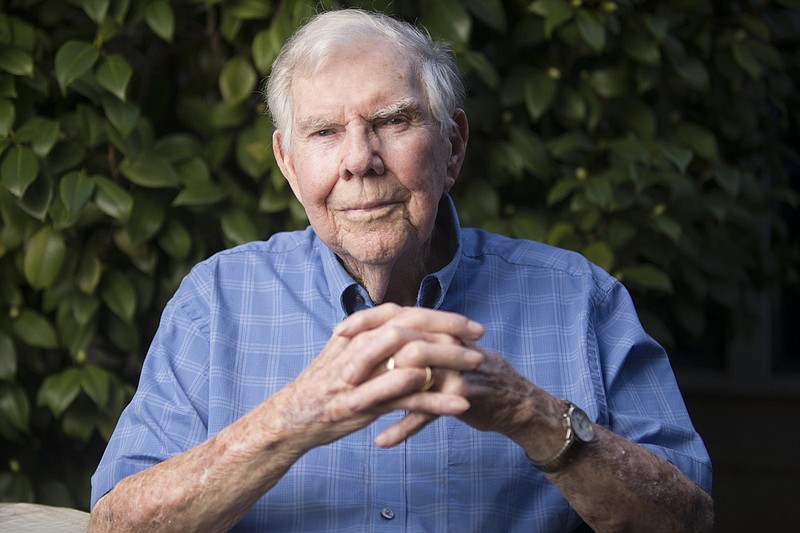When you vote - if you vote - please take a moment to mentally thank Earl "Bo" Cline.
Cline, who turned 100 years old in January, is a former World War II airman and POW.
He is one of the few people you'll meet who is old enough to have voted for both Franklin Delano Roosevelt and Donald J. Trump.
Cline consistently votes Republican now, he said, and can't think of any presidential votes he would take back, with the possible exception of a ballot cast for Richard Nixon. "I kinda think that was a mistake," he said.
He worries about the growing national debt, he said, and what he believes are the too-liberal leanings of younger voters. He thinks mandatory military service would promote self discipline.
On Election Day Nov. 3, Cline plans to make the short trip from his house to a nearby Brainerd voting precinct to vote in another presidential election.
He said he is disappointed in the harsh tone of the 2020 race so far.
"I think it's about the dirtiest election I've ever seen," he said. "People calling each other liars. ... And these are high officials. It seems like all civility has become lost ... on both sides."
Anyone who doesn't see the link between American war heroes, such as Cline, and our enduring representative democracy and attendant voting rights is not paying attention.
Sitting on the back porch of his Brainerd house earlier this week with a fall breeze blowing through his gray hair, Cline let his thoughts drift back to that POW camp in Germany where he spent about six months in late 1944 and early 1945.
Cline was a second lieutenant, a bombardier/navigator in a U.S. Army Air Corps airplane that was shot down two days before Christmas in 1944. He parachuted out of his aircraft after it was hit during an attack by German fighter planes.
As a POW he was put in a barrack - a shed, really - with 23 other prisoners. They ate small daily portions of bread, cut to the millimeter to ensure equal portions, and then they toasted the crust to make a delicacy they called "kriegy nuts" - from "krieg," the German word for war.
 Staff photo by Troy Stolt / 100-year-old World War 2 veteran Bo Cline holds the bowl he ate out of while in a German POW camp in World War 2 as he sits for a portrait on Monday, Oct. 12, 2020 in Chattanooga, Tenn. Cline earned the rank of 2nd lieutenant while he as a bombardier navigator in the 391st bomb group 574 squad, 9th Air Force. During the battle of the Buldge, Clineͳ plane was shot down during a bombing mission intended to hit the German village of Ahrweiler, when he made it to the ground he was captured by German soldiers and spent the next 8 months in a German POW camp until the camp was freed by the Soviet Army.
Staff photo by Troy Stolt / 100-year-old World War 2 veteran Bo Cline holds the bowl he ate out of while in a German POW camp in World War 2 as he sits for a portrait on Monday, Oct. 12, 2020 in Chattanooga, Tenn. Cline earned the rank of 2nd lieutenant while he as a bombardier navigator in the 391st bomb group 574 squad, 9th Air Force. During the battle of the Buldge, Clineͳ plane was shot down during a bombing mission intended to hit the German village of Ahrweiler, when he made it to the ground he was captured by German soldiers and spent the next 8 months in a German POW camp until the camp was freed by the Soviet Army.The prisoners occasionally got soup and potatoes, too, and Cline ate from a tin dish fashioned from a milk container.
"We were locked up in the barracks every night," Cline recalled cv. "There were dogs in the compound, and guards. Then, we got up on the morning of June 8 [1945] and the guards were gone."
After being liberated by advancing Russian troops, Cline returned to the United States, went to college with the help of the GI Bill, and eventually settled in Chattanooga, where he spent 30 years working for the former Provident Life and Accident Insurance Co., now Unum, before retiring in his early 60s.
"I've been retired longer than I ever worked," he said. "I snookered those actuaries."
After he retired, some of the former POWs from the German barrack he was in began meeting in a different city every year. Ultimately, 18 of the 24 men were located and became part of the yearly reunion group.
Slowly, their numbers dwindled until Cline and a man in Texas were the only two survivors left. Then, one day a couple of years ago, the Texas man's son telephoned to tell Cline that his father had died and that Cline would be receiving a package in the mail.
"At one of our [previous POW] meetings we had gotten this bottle of champagne, and the last guy standing was supposed to get it," Cline explained.
In the spirit of the game, Cline and his family popped the cork one recent Thanksgiving and remembered his friends.
On behalf of his POW buddies, Cline has a word of advice for all Americans during this election season: "Vote."
"Everybody who's a legal American citizen should vote," he said.
We owe it to our veterans.
And we especially owe it to ex-POWs such as Bo Cline.
Contact Mark Kennedy at mkennedy@timesfreepress.com.
 Staff photo by Troy Stolt / 100-year-old World War 2 veteran Bo Cline sits for a portrait on Monday, Oct. 12, 2020 in Chattanooga, Tenn. Cline earned the rank of 2nd lieutenant while he as a bombardier navigator in the 391st bomb group 574 squad, 9th Air Force. During the battle of the Buldge, Cline۪s plane was shot down during a bombing mission intended to hit the German village of Ahrweiler, when he made it to the ground he was captured by German soldiers and spent the next 8 months in a German POW camp until the camp was freed by the Soviet Army.
Staff photo by Troy Stolt / 100-year-old World War 2 veteran Bo Cline sits for a portrait on Monday, Oct. 12, 2020 in Chattanooga, Tenn. Cline earned the rank of 2nd lieutenant while he as a bombardier navigator in the 391st bomb group 574 squad, 9th Air Force. During the battle of the Buldge, Cline۪s plane was shot down during a bombing mission intended to hit the German village of Ahrweiler, when he made it to the ground he was captured by German soldiers and spent the next 8 months in a German POW camp until the camp was freed by the Soviet Army.